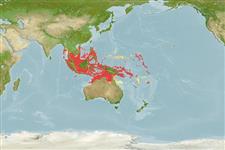>
Scombriformes (Mackerels) >
Scombridae (Mackerels, tunas, bonitos) > Scombrinae
Etymology: Rastrelliger: Latin, rastra = rake + Latin, gero = to carry.
More on author: Bleeker.
Environment: milieu / climate zone / depth range / distribution range
ນິເວດວິທະຍາ
ສັດທະເລ; ນ້ຳກ່ອຍ; ປາທີ່ມີການເຄື່ອນຍ້າຍໃນສະເພາະມາະຫາສະມຸດ (Ref. 51243); ລະດັບຄວາມເລິກ 15 - 200 m (Ref. 28016). Tropical; 20°C - 30°C (Ref. 54858); 18°N - 18°S, 93°E - 180°E (Ref. 54858)
Pacific Ocean: Andaman Sea to Thailand, Indonesia, Papua New Guinea, Philippines, Solomon Islands and Fiji.
Length at first maturity / ຂະໜາດ / ນ້ຳໜັກ / Age
Maturity: Lm 17.3 range ? - ? cm
Max length : 34.5 cm FL ຕົວຜູ້/ບໍ່ມີເພດ; (Ref. 168); common length : 20.0 cm FL ຕົວຜູ້/ບໍ່ມີເພດ; (Ref. 168); ອາຍຸສູງສຸດທີ່ເຄຍລາຍງານມາ: 2.00 ປີ (Ref. 796)
ຄີ (ໜາມ)ແຂງຢູ່ຫຼັງປາ (ທັງໝົດ): 8 - 11; ຄີຫຼັງຂອງປາ (ຄີອ່ອນ) (ທັງໝົດ): 12; ຄີ(ໜາມ) ແຂງຢູ່ຄີກົ້ນປາ
ກຸ່ມປາກະດູກແຂງ
ຄວາມຖີ່ຂອງກຸ່ມຖ່າຍທອດພັນ
ປາທີ່ມີການເຄື່ອນຍ້າຍຈາກທະເລໄປຫານ້ຳຈືດ ແລະນ້ຳຈືດຫາທະເລ
ປາທີ່ມີການເຄື່ອນຍ້າຍຈາກທະເລແລະໄປໄຂ່ຢູ່ນ້ຳຈືດ
ຄີກົ້ນຂອງປາ
ສັດທີ່ມີກະດູກສັນຫັຼງ
ການຖ່າຍທອດທາງກຳມະພັນຈາກພໍ່ແມ່ຫາລູກ 0; ຄີກົ້ນຂອງປາ: 12; ສັດທີ່ມີກະດູກສັນຫຼັງ: 31. This species is distinguished by the following characters: body very deep, its depth at posterior margin of opercle 3.7-4.3 times in fork length; head equal to or less than body depth; maxilla covered by lacrimal bone but extending nearly to end of lacrimal; gill rakers very long, visible when mouth is opened, 30-48 on lower limb of first gill arch; numerous bristles on longest gill raker, about 150 on one side in specimens of 12.7 cm, 210 in specimens of 16 cm, and 240 at 19 cm fork length; intestine very long, 3.2-3.6 times fork length; snout pointed; swim bladder present; vertebrae 13 + 18 = 31; interpelvic process small and single; anal spine rudimentary. Colour of spinous dorsal fin yellowish with a black edge, pectoral and pelvic fins dusky, other fins yellowish (Ref. 168, 9684).
An epipelagic, neritic species that tolerates slightly reduced salinities in estuarine habitats and in areas where surface temperature range between 20° and 30°C. It forms schools of equally sized individuals. Batch spawning is believed to extend from March through September. Feeds chiefly on microzooplankton with a high phytoplankton component. Marketed fresh, frozen, canned, dried salted and smoked (Ref. 168, 9684).
Collette, B.B. and C.E. Nauen, 1983. FAO Species Catalogue. Vol. 2. Scombrids of the world. An annotated and illustrated catalogue of tunas, mackerels, bonitos and related species known to date. Rome: FAO. FAO Fish. Synop. 125(2):137 p. (Ref. 168)
IUCN Red List Status (Ref. 130435)
Threat to humans
Harmless
Human uses
ການປະມົງ: ທີ່ມີການຄ້າສູງ; ຊະນິດປາທີ່ຖືກນຳໃຊ້ເຂົ້າໃນການຫາເພື່ອເປັນເກມກິລາ: ແມ່ນ
ເຄື່ອງມື
Special reports
Download XML
ແຫຼ່ງອີນເຕີເນັດ
Estimates based on models
Preferred temperature (Ref.
123201): 23.3 - 28.4, mean 27.2 °C (based on 781 cells).
Phylogenetic diversity index (Ref.
82804): PD
50 = 0.6250 [Uniqueness, from 0.5 = low to 2.0 = high].
Bayesian length-weight: a=0.00955 (0.00815 - 0.01119), b=3.06 (3.02 - 3.10), in cm total length, based on LWR estimates for this species (Ref.
93245).
ຊັ້ນເຂດຮ້ອນ (Ref.
69278): 2.7 ±0.31 se; based on food items.
Generation time: 0.9 (0.8 - 1.1) years. Estimated as median ln(3)/K based on 38
growth studies.
ຄວາມຢືດຢຸ່ນ (Ref.
120179): ສູງ, ປະຊາກອນຕຳ່ສຸດທີ່ໃຊ້ເວລາສອງໜ້ອຍກວ່າ 15 ເດືອນ (K=0.6-1.6; tmax=2).
Prior r = 1.19, 95% CL = 0.79 - 1.79, Based on 3 stock assessments.
Fishing Vulnerability (Ref.
59153): Low vulnerability (18 of 100).
Climate Vulnerability (Ref.
125649): High to very high vulnerability (69 of 100).
Nutrients (Ref.
124155): Calcium = 241 [85, 719] mg/100g; Iron = 3.44 [1.55, 7.60] mg/100g; Protein = 20.8 [19.5, 22.1] %; Omega3 = 0.366 [0.161, 0.855] g/100g; Selenium = 66.4 [19.0, 217.7] μg/100g; VitaminA = 10.8 [2.1, 48.4] μg/100g; Zinc = 1.95 [1.04, 5.00] mg/100g (wet weight); based on
nutrient studies.
